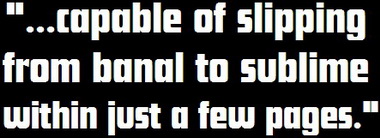|
| |
|
STORY PLACEMENT THIS STORY TAKES PLACE BETWEEN THE NOVELS "FRONTIER
WORLDS" AND
"THE
WRITTEN BY NATALIE DALLAIRE & STEPHEN COLE
RECOMMENDED PURCHASE OFFICIAL BBC 'EIGHTH DOCTOR' PAPERBACK (ISBN 0-563-55590-4) RELEASED IN JANUARY 2000.
BLURB FLEEING AN EXPLODING SPACE STATION IN TINY LIFE CAPSULES, the Do- ctor and Compassion ARE TAKEN prisoner BY AGENTS OF Parallel 59, a militaristic power on the planet Skale. Meanwhile, Fitz finds himself APPARENTLY safe in a colony for
convalescents. swing on Skale, with each of the planet's many blocs desperate to be first to reach the stars. If the TIME LORD's knowledge CAN help Parallel 59 to succeed, the conseqU- ences for the rest of the world could be
devastating.
of his friends' FATE. Enjoying his new life, he's not even sure he wants to be rescued -
which is a good thing. has no intention of COMING. He's decreed that Fitz's new-found utopia must be UTTERLY destroyed. |
|
|
Parallel 59 JANUARY 2000
Written by newcomer Natalie Dallaire and then-editor of the range Stephen Cole, Parallel 59 is quite a curiosity. The lines of blood that drip down Black Sheep’s evocative cover illustration might suggest two parallel narrative threads, but in truth they’re about as parallel as chalk and cheese. This book is a quiet and introspective thriller that gracefully probes Fitz’s neuroses, but it’s also a hackneyed, totalitarian bloodbath that calls to mind more episodes of Blake’s 7 than it does pages of 1984.
Within the space of just a few pages, Parallel 59 carves up the TARDIS crew, with Fitz sent on his way to a virtual utopia whilst the Doctor and Compassion are captured and inevitably interrogated by the paranoid militia of the planet Skale. These two threads are then carried through the whole book, presumably with Dallaire penning Fitz’s sections and Cole the rest.
Fitz’s story is by far the most engrossing strand, as the Doctor and Compassion’s is for the most part painfully routine. I do have to applaud the authors’ audacity, however: having the Doctor and his female companion stripped of their clothing is a controversial enough move without the Doctor’s continual stream of naïve faux-pas. The scene where he runs over to the self-consciously naked Compassion, arms outstretched to give her a hug, is absolutely hilarious, if a little excruciating.
Indeed, what the Doctor and Compassion’s half of the tale lacks in noteworthy plot is made up for through some deft characterisation. Compassion remains as impenetrable as ever, yet the hell that she’s put through in the first fifty pages or so does betray a little humanity, and the Doctor is on robust and riotous form. Whether he’s streaking, tickling or verbally overwhelming his captors, Paul McGann’s zeal shines through in spates, together with just a few fleeting glimpses of that human doubt which sets his incarnation apart from the rest.
Fitz, conversely, is handled with great delicacy. Lost in what appears to be a communist utopia, he decides to try and make the best of his situation until such time as the Doctor comes to rescue him. And at first, he makes quite a success of it; at least, he does by his own formerly shallow standards. Suddenly he’s a player - he has a couple of good friends and even more lovers: a lonely wife, a stunning young woman, and perhaps even a love to rival that he was so cruelly robbed of in Frontier Worlds.
through this dystopian soap opera, we enjoy Fitz’s first-person account; his continuing ruminations on the TARDIS’ reconstruction of him, and its strange side-effects, such as his newfound affinity for anagrams and ability to attract lots of women at the same time. The authors broach the intricate question of identity with appropriate poise and distance, leaving the Doctor’s tormented companion teetering on the edge of the question that will threaten to tear his very soul apart.
Fitz’s mounting alienation is then brought into even sharper focus when he discovers that the world he’s been living in isn’t real. In an exquisite sequence that put me in mind of the recent Ashes to Ashes climax, the world literally falls away from Fitz, leaving only a haunting starscape and a grey void. But Fitz hasn’t been languishing in some colourful 1980s police purgatory – he’s been enslaved to a machine, Matrix-style; living a life inside a simulacrum whilst his mind was raped, used to help control quasi-organic weaponry that would destroy millions of lives. And the worst part is, Fitz’s friends and lovers were real even though their world wasn’t. The faces that he saw were merely avatars for the poor souls trapped inside the simulation with him.
Parallel 59’s fraught finale is wrought with angst and tension, leading to such a disastrous defeat for the Doctor that the gentle hope of the few lives saved is crushed by the rampant death and despair. The book’s final scene has particular resonance as Fitz locks his gaze on one of his fellow survivors as she emerges from the machine – a “spindly thin” woman with a bad arm – and realises that she is his lover, Filippa. And she right stares back…
Parallel 59 is one of the few novels in the range capable of slipping
from banal to sublime within just a few pages. Resultantly its most potent
scenes feel even more outstanding than they might have done had they stood
alone, whilst its less stimulating moments make for even poorer reading
than they probably would have done were the whole book equally drab.
Ultimately though, its more impressive qualities make it well worth the
read, particularly if you’re following the loose ‘Compassion’ arc through
to its imminent conclusion...
|
|
|
Copyright © E.G. Wolverson 2010
E.G. Wolverson has asserted his right under the Copyright, Designs and Patents Act, 1988 to be identified as the author of this work. |
|
|
Unless otherwise stated, all images on this site are copyrighted to the BBC and are used solely for promotional purposes. ‘Doctor Who’ is copyright © by the BBC. No copyright infringement is intended. |
|

.jpg)
.jpg)

 As
Dallaire and Cole shepherd us
As
Dallaire and Cole shepherd us